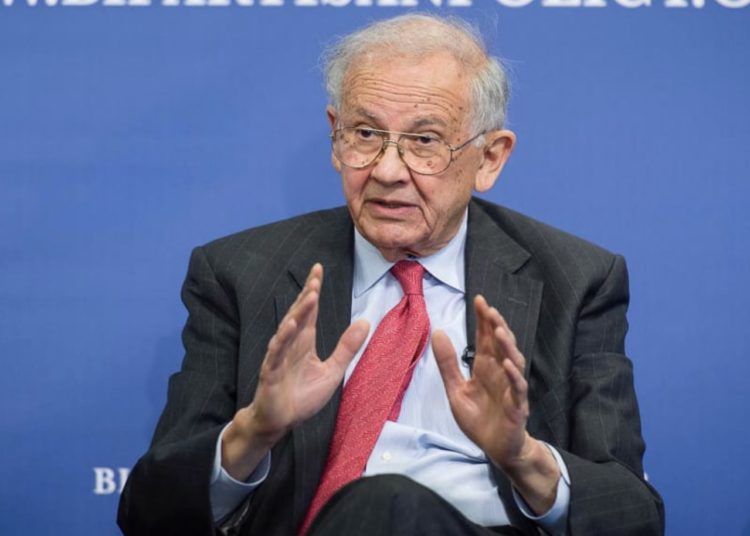Abdullah Bozkurt
A Turkish prosecutor falsely claimed that Morton I. Abramowitz, a former US ambassador to Turkey, served as director of the Central Intelligence Agency in an indictment that is full of conspiracies, innuendos and false accusations.
The 137-page indictment sounds more like a political statement than a legal text and rehashes talking points often heard from officials of the Islamist government in Turkey. In a bid to try to make a case against members of the government-critical Gülen movement, Turkish prosecutor Ruşen Güneş in the southeastern province of Şanlıurfa claimed that Fethullah Gülen, a US-based Turkish Muslim scholar, had met with Abramowitz between 1983 and 1990 and established a friendship.

Abramowitz, a career diplomat who worked for the State Department from 1959 until his retirement in 1991, was never appointed CIA director. He served as ambassador in Turkey for two years between 1989 and 1991, and had previously been ambassador to Thailand. He was the assistant secretary of state for intelligence and research between 1985 and 1989 and is a member of the Bipartisan Policy Center’s Task Force on Managing Disorder in the Middle East.
The indictment also accused Gülen of meeting with Abraham Foxman, former director of the Anti-Defamation League, and Pope John Paul II in a further spin to portray Gülen’s outreach activities in interfaith dialogue as evil deeds in a web conspiracy aimed at providing legal cover for growing xenophobia and anti-Semitism in Turkey. The prosecutor alleged that Gülen made a statement against Turkey every time the US, Israel and other powerful countries experienced problems with Turkey. He cited the Mavi Marmara incident in 2010, the interception of illegal arms shipments to jihadists in Syria in 2014, the shooting down of a Russian warplane in 2015 and the killing of 34 Kurdish villagers in Uludere in Turkish aerial bombing campaign in 2011.

Such statements are not unique to Güneş’s indictments and can be found in most other indictments that were filed against members of the Gülen movement as well as other government critics. In fact Güneş wrote in the introductory part of the text that he borrowed statements from other indictments issued across the country. According to the official figures, over half a million of people have been detained in Turkey in the last three years over alleged roles in the movement, and most were charged under similar pretexts.
Güneş’s indictment, listed under case file No. 2017/49, accused 18 defendants, mostly medical doctors, of terrorism. No real evidence was presented to support the serious charges. The prosecutor cited the defendants’ volunteer work for charities, their travel abroad, the enrollment of their children in Gülen-linked schools and their subscriptions to newspapers critical of the government as evidence to back up his claims.
The defendants’ use of messaging applications such as Bylock, Eagle, Skype, Coco, Tango, WhatsApp, Viber, ICQ, Line, Telegram, Facebook/Messenger, Twitter, Bip, İmo, Wechat, Kik and others were listed as criminal acts without providing any content of messages allegedly exchanged among suspects. This far-fetched claim explains why Turkey has been criticized by the United Nations for its attempts to criminalize encrypted messaging applications.

The indictment also insults the reader’s intelligence by claiming that the arms-filled trucks intercepted in January 2014 as they were heading for jihadists in Syria were actually carrying humanitarian aid. Photos and video recordings as well as a ballistics test clearly showed that mortar shells, fuses and ammunition were packed into the trucks, escorted by Turkey’s National Intelligence Organization (MIT). Yet he claimed that the Gülen movement tried to create the perception that arms were being transported in the intercepted trucks and that it used the gendarmerie to expose it.

Small wonder that the Turkish government’s repeated requests, starting in 2014, for Gülen’s extradition have failed. Turkey must complete a series of legal procedures and meet evidentiary standards before any official extradition request is granted by the United States. The agreement between the two countries stipulates that extradition will not be granted for an offense if it is of “a political character,” or where extradition seeks to prosecute or punish a person “on account of his political opinions.” In the case of Gülen, it is clear that Erdoğan and his judges were going after critics on politically motivated charges and wanted to punish them for their political views.
On July 19, 2016 Turkey submitted to the US a request to arrest Gülen, and on July 23, 2016, formally submitted an extradition request. After reviewing the requests, the US Department of Justice informed its Turkish counterpart that the requests had not yet met the legal standards for extradition required by the US-Turkey extradition agreement and US law. Accordingly, the Department of Justice noted, extradition could not go forward, absent additional evidence substantiating the allegations.
The indictment filed by Güneş is a typical example of politically motivated accusations against Gülen and his followers, the most vocal critics of Turkish President Recep Tayyip Erdoğan’s corrupt and oppressive regime.












